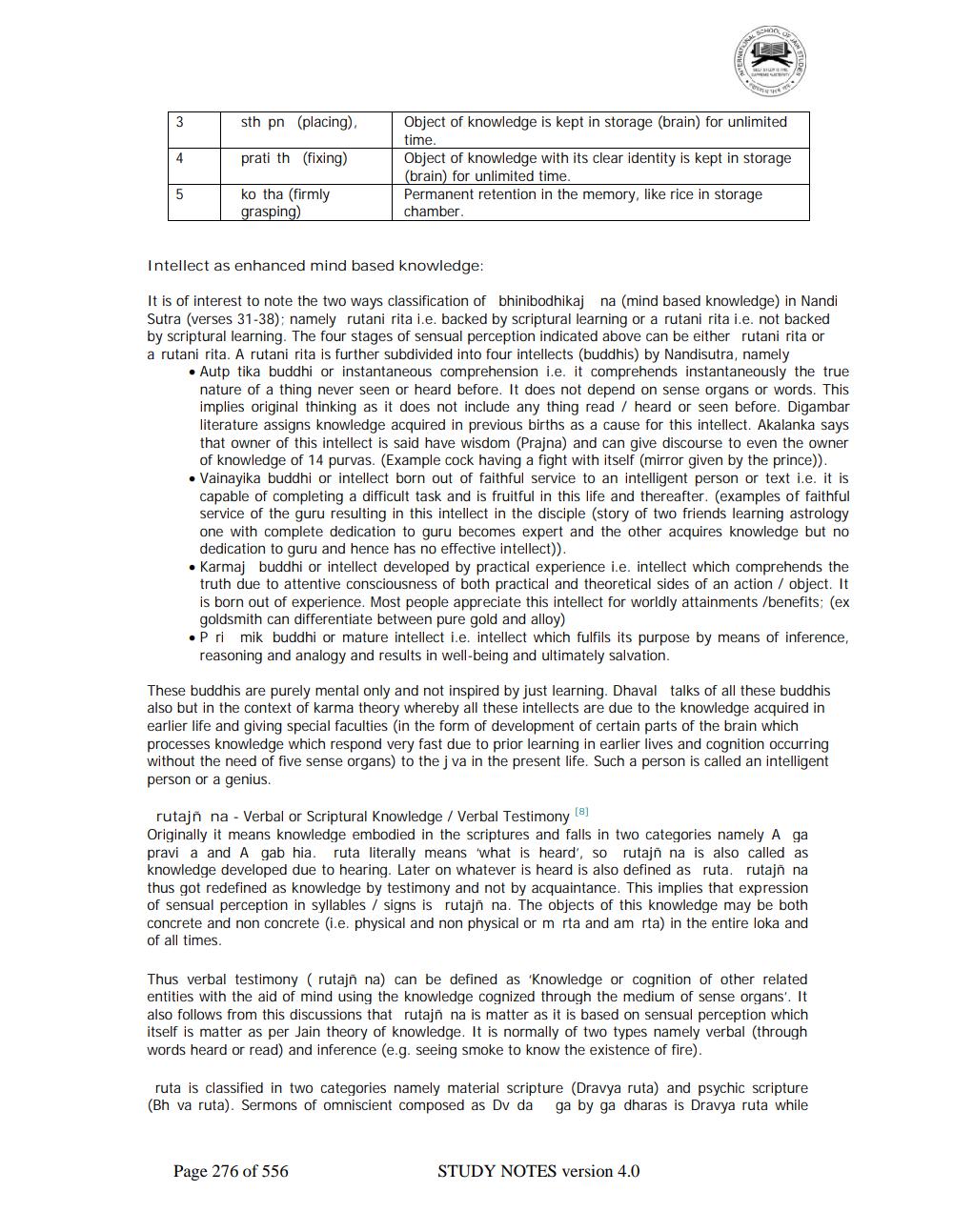________________
3
4
5
sth pn (placing),
prati th (fixing)
ko tha (firmly grasping)
Object of knowledge is kept in storage (brain) for unlimited time.
Object of knowledge with its clear identity is kept in storage (brain) for unlimited time.
Permanent retention in the memory, like rice in storage chamber.
Intellect as enhanced mind based knowledge:
It is of interest to note the two ways classification of bhinibodhikaj na (mind based knowledge) in Nandi Sutra (verses 31-38); namely rutani rita i.e. backed by scriptural learning or a rutani rita i.e. not backed by scriptural learning. The four stages of sensual perception indicated above can be either rutani rita or a rutani rita. A rutani rita is further subdivided into four intellects (buddhis) by Nandisutra, namely
• Autp tika buddhi or instantaneous comprehension i.e. it comprehends instantaneously the true nature of a thing never seen or heard before. It does not depend on sense organs or words. This implies original thinking as it does not include any thing read / heard or seen before. Digambar literature assigns knowledge acquired in previous births as a cause for this intellect. Akalanka says that owner of this intellect is said have wisdom (Prajna) and can give discourse to even the owner of knowledge of 14 purvas. (Example cock having a fight with itself (mirror given by the prince)). • Vainayika buddhi or intellect born out of faithful service to an intelligent person or text i.e. it is capable of completing a difficult task and is fruitful in this life and thereafter. (examples of faithful service of the guru resulting in this intellect in the disciple (story of two friends learning astrology one with complete dedication to guru becomes expert and the other acquires knowledge but no dedication to guru and hence has no effective intellect)).
• Karmaj buddhi or intellect developed by practical experience i.e. intellect which comprehends the truth due to attentive consciousness of both practical and theoretical sides of an action / object. It is born out of experience. Most people appreciate this intellect for worldly attainments /benefits: (ex goldsmith can differentiate between pure gold and alloy)
Pri mik buddhi or mature intellect i.e. intellect which fulfils its purpose by means of inference, reasoning and analogy and results in well-being and ultimately salvation.
These buddhis are purely mental only and not inspired by just learning. Dhaval talks of all these buddhis also but in the context of karma theory whereby all these intellects are due to the knowledge acquired in earlier life and giving special faculties (in the form of development of certain parts of the brain which processes knowledge which respond very fast due to prior learning in earlier lives and cognition occurring without the need of five sense organs) to the j va in the present life. Such a person is called an intelligent person or a genius.
[8]
rutajn na - Verbal or Scriptural Knowledge / Verbal Testimony
Originally it means knowledge embodied in the scriptures and falls in two categories namely A ga pravi a and A gab hia. ruta literally means 'what is heard', so rutajn na is also called as knowledge developed due to hearing. Later on whatever is heard is also defined as ruta. rutajn na thus got redefined as knowledge by testimony and not by acquaintance. This implies that expression of sensual perception in syllables / signs is rutajn na. The objects of this knowledge may be both concrete and non concrete (i.e. physical and non physical or m rta and am rta) in the entire loka and of all times.
Thus verbal testimony (rutajn na) can be defined as 'Knowledge or cognition of other related entities with the aid of mind using the knowledge cognized through the medium of sense organs'. It also follows from this discussions that rutajn na is matter as it is based on sensual perception which itself is matter as per Jain theory of knowledge. It is normally of two types namely verbal (through words heard or read) and inference (e.g. seeing smoke to know the existence of fire).
Page 276 of 556
ruta is classified in two categories namely material scripture (Dravya ruta) and psychic scripture (Bh va ruta). Sermons of omniscient composed as Dv da ga by ga dharas is Dravya ruta while
STUDY NOTES version 4.0




